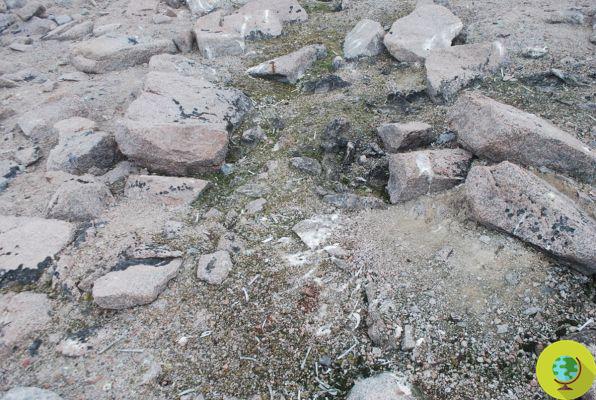With global warming and the melting of snow and ice in Antarctica, a penguin cemetery has re-emerged
With global warming and the melting of snow and ice in Antarctica, researcher Steven Emslie has made a truly incredible discovery, namely the discovery of carcasses of Adelie penguins (Pygoscelis adeliae) in an area where there was no colony of this species, for at least a century.
The research was published by the Geological Society of the United States. As we said, the zoologist of the University of North Carolina, Steven Emslie made an unusual discovery: with the melting of snow and ice, the decomposing remains of Adélie penguins were found in an area of Cape Irizar in the Ross Sea. .
Ancient Adelie penguin colony revealed by snowmelt at Cape Irizar, Ross Sea, Antarctica
(image of 800-yr old penguin #mummy by Steven Emslie)https://t.co/zPgCfT1cMW pic.twitter.com/bMlLKJPPZ2
— Mostly Mammoths (@MostlyMammoths) September 28, 2020
A colony of this species had never been recorded in this area for a century now, which is why the find left the researcher speechless. The carcasses are mostly from pups that have a high mortality rate when they are born in the colder seasons of the year. In addition to the small bodies, there were also adult penguins, a sign that there was indeed a colony here. Emslie and her colleagues collected some of these remains for further radiocarbon analysis. But not only that, along the promontory, researchers have found former nesting sites of Adélie penguins.
“We recovered bones, feathers, egg shells, but also fish bones in a now dry and dusty ground,” explains Emslie.

@geology
Analyzes indicate that there are at least three periods of occupation, the last of which 800 years ago, while the oldest about 5 years ago. As the snowpack and ice increased, the remains remained under the ground and remained intact until the recent melting. Compared to the 1,5s, global warming has caused the temperature of the Ross Sea to rise between 2 and XNUMX degrees Celsius. The research was funded by the National Science Foundation and the US Antarctic Program.
"Global warming is increasingly persistent in Antarctica and the Ross Sea and could cause new colonies of penguins to emerge in an area that appeared to be deserted," concludes Emslie.
Fonte: Geology
Read also:
- The Apennine chamois is in danger of becoming extinct by 2070 due to global warming
- Fires in Australia are clearly linked to global warming
- The impressive video from NASA showing more than a century of global warming in time-lapse


























